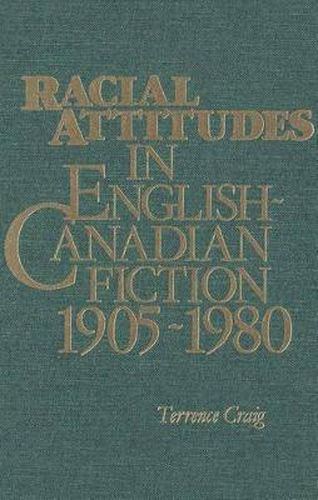Readings Newsletter
Become a Readings Member to make your shopping experience even easier.
Sign in or sign up for free!
You’re not far away from qualifying for FREE standard shipping within Australia
You’ve qualified for FREE standard shipping within Australia
The cart is loading…






Racial Attitudes in English-Canadian Fiction is a critical overview of the appearances and consequences of racism in English-Canadian fiction published between 1905 and 1980. Based on an analysis of traditional expressions in literature of group solidarity and resentment, the study screens English-Canadian novels for fictional representations of such feelings. Beginning with the English-Canadian reaction to the mass influx of immigrants into Western Canada after World War One, it examines the fiction of novelists such as Ralph Connor and Nellie McClung. The author then suggests that the cumulative effect of a number of individual voices, such as Grove and Salverson, constituted a counter-reaction which has been made more positive by Laurence, Lysenko, Richler and Clarke. The debate between these two sides, carried on in fictional and non-fictional writing, is seen to be in part resolved in synthesis after World War Two, as attitudes are forced by wartime alliances and intellectual pressures into a qualified liberalism. The author shows how single novels by Graham, Bodsworth, and Callaghan demonstrated a new concern for the exposure and eradication of racial discrimination, an attitude taken further by the works of Wiebe and Klein. The book concentrates on single texts that best portray deliberately or not, racist ideology or anti-racist arguments, and attempts to explain the arousal in Canada of such ideas.
$9.00 standard shipping within Australia
FREE standard shipping within Australia for orders over $100.00
Express & International shipping calculated at checkout
Racial Attitudes in English-Canadian Fiction is a critical overview of the appearances and consequences of racism in English-Canadian fiction published between 1905 and 1980. Based on an analysis of traditional expressions in literature of group solidarity and resentment, the study screens English-Canadian novels for fictional representations of such feelings. Beginning with the English-Canadian reaction to the mass influx of immigrants into Western Canada after World War One, it examines the fiction of novelists such as Ralph Connor and Nellie McClung. The author then suggests that the cumulative effect of a number of individual voices, such as Grove and Salverson, constituted a counter-reaction which has been made more positive by Laurence, Lysenko, Richler and Clarke. The debate between these two sides, carried on in fictional and non-fictional writing, is seen to be in part resolved in synthesis after World War Two, as attitudes are forced by wartime alliances and intellectual pressures into a qualified liberalism. The author shows how single novels by Graham, Bodsworth, and Callaghan demonstrated a new concern for the exposure and eradication of racial discrimination, an attitude taken further by the works of Wiebe and Klein. The book concentrates on single texts that best portray deliberately or not, racist ideology or anti-racist arguments, and attempts to explain the arousal in Canada of such ideas.